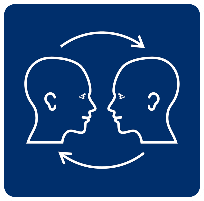- What is Parkinson’s disease?
Parkinson’s is a progressive neurological condition that affects dopamine-producing cells in a part of the brain called the substantial nigra. The reduction of dopamine results in movement problems including involuntary shaking or tremor – these are the classic symptoms most people associate with PD. A person with PD may also experience muscle stiffness, or rigidity, and very slow movements (bradykinesia). They may walk with a shuffling gait – hunched over with limited arm movement. Muscle cramps and spasms are not uncommon. The person may also find facial expression difficult, which can affect how people interpret meaning. Fine finger movements can also be a challenge. PD is also associated with speech problems (dysarthria) and swallowing problems (dysphagia).
Having PD increases the risk of developing cognitive impairments and memory problems. Depression is a common symptom: not just as a reaction to the disease. Medicines prescribed to manage PD can cause visual hallucinations, and people with PD may think they see animals and people, especially deceased relatives and pets. Sometimes hallucinations can occur even if someone is not on medication for their Parkinson’s.
- Will it get better?
Parkinson’s disease is progressive, meaning symptoms will not improve as time passes. Prescription medications that create or act like dopamine or inhibit the breakdown of dopamine can ease symptoms. Advances in treatment options mean that a person diagnosed with Parkinson’s disease is now likelier to have a near-normal life expectancy. Support from a physiotherapist, occupational therapist, speech and language therapist and dietician can help to increase independence and quality of life.
- Why is AAC useful?
As Parkinson’s disease progresses, a person may experience a reduction in how loud or how fast they can speak. Their speech may start to become unintelligible, with difficulty articulating some speech sounds. An AAC system can help someone with Parkinson’s communicate more clearly.
- What type of AAC is best?
The best AAC system will depend on a variety of factors including a person’s motor symptoms, cognitive abilities, speech and language skills, attitude and personal preferences. Voice amplifiers, alphabet boards and picture charts can help people with Parkinson’s disease as they begin to experience various speech difficulties. If their speech deteriorates further, a hi-tech device with a voice output function may be helpful.
- Where can I find out more?
The speech and language therapist of a person with PD will be able to offer information and advice as well as support.
Parkinson’s UK offers wide-ranging information and support for people diagnosed with the disease and their carers. It also operates a helpline – 0808 800 0303.
See also
- FAQs – AAC and Autism Spectrum Disorder (ASD)
- FAQs – AAC and cerebral palsy (CP)
- FAQs – AAC and developmental difficulties
- FAQs – AAC and employment
- FAQs – AAC and general paediatric care
- FAQs – AAC and hospitalisation
- FAQs – AAC and locked-in syndrome
- FAQs – AAC and Parkinson’s Disease (PD)
- FAQs – AAC and stroke and aphasia
- FAQs – AAC and training
- FAQs – AAC assessment and clinical decision-making
- FAQs – the law, policy and services





